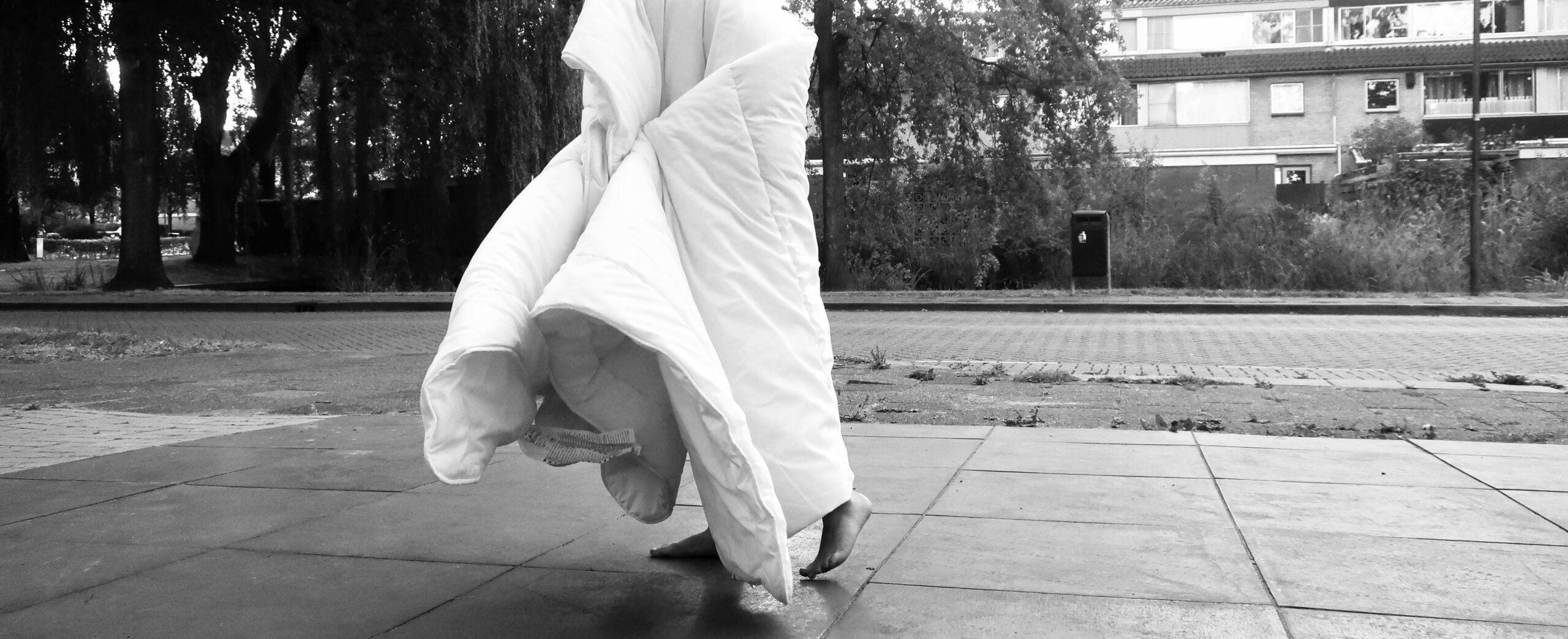Semi-Academic Pieces
White Cushion: Call for Disturbance
Defne Yalman & Jülide Sezer
After months of ongoing threats and political discussions, Russia invaded Ukraine on the 24th of February, 2022. According to Putin, by using Ukrainian territory, NATO desires to come close to the Russian border and cause a territorial threat. The war caused a global outcry, and it was inevitable not to discuss the topic among our counterparts in the Netherlands. According to the unsatisfying outcome of our discussions, the need for the “urgent call for disturbance” has emerged. The large number of people choosing to preserve their silence and stay unconnected has created another layer to our anxieties about the situation. We need to remind ourselves and each other that we are in this together and shift our focus to the now and ask the question: what can we do about it?
“Let’s not put political pressure on individuals,’’ is a repetitive sentence we hear in discussions. It is a handy way of criticizing neoliberalism. But if we -individuals- will not talk about and question what is going on further than our doorsteps, then why do we keep repeating “personal is political” in our (feminist) discussions? If we do not contextualize “personal is political” to a broader societal context, then it frames the idea that something is problematic until it touches you. Was Carol Hanish wrong, or is she understood wrong? The white feminist legacy has left us with the burden of white saviorism. We tend to think of creating solutions for intertwined situations happening beyond our reach. Consequently, we fall into the trap of neoliberal discussions and leave each other with the feeling of “what can I do?” These political strategies have trained us to feel miserable toward cruel actions such as war. Wars make us feel little, and we fall into the feeling of saving-helping each other to find a way out of misery. We can actively think about what is going on without the urge to save “unfortunate ones.” Thus, instead, we choose and invite the reader to stay with the trouble (Haraway 2016). How to stay with the trouble in the midst of a war?

As feminist activists born and raised in Turkey, we acknowledge our situatedness within the spectrum of being oppressed and the oppressor. Nurdan Gürbilek (2007) situates Turkey elaborately through the metaphor of the pendulum. The swinging movement of the pendulum from the idealized West to the East. The desire to be like the West and despise it, the anxiety to separate from the East and scorn it. The endless tension of the East-West binary is moving from one end to the other. Turkey has invaded Syria and maintains its sovereignty in Kurdish regions. Moreover, as it has never shown a stable stance between imperial powers, it can be argued that it does not have political grounding or that the political ground is exactly what Gürbilek called the “pendulum” within the international political agenda. As holding personal histories of being not voluntarily on the side of the oppressor and the oppressed, we invite the reader not to pick a side from Russia vs. the U.S.; instead, we urge you to think, discuss, elaborate, and broaden your horizons about now. As stated earlier, while a conclusion is not necessary, vulnerability and openness to each other are necessary for transnational solidarity. We would like to provoke the reader to feel uncomfortable and think about anxiety. We do not have regional expertise and do not hold degrees to analyze the socio-historical and political relationships of the involved states. Therefore, we would like to leave the analysis of this war to those who have more expertise and knowledge than us. What we intend to accomplish is an intervention to silence. We urge you to explore the power of your emotions and remember that disastrous events hold an illusionary distance from our physical materiality. The provocation for disturbance is a call to take/share responsibility with/towards the world.
The legacy of the Human originates in the West and is spread worldwide with its privilege. The privilege nowadays is repeatedly known as “white privilege.” However, it is essential to highlight that the privilege of whiteness goes beyond skin color. Thus, all white people are privileged is a myth. Whiteness is a colonial construction to which only some part of the human population can be entitled. Some other adjectives have been associated with whiteness, such as white innocence (Wekker 2017) and white fragility (DiAngelo 2018). Accordingly, whiteness grants people fragile sensitivity and political irresponsibility. This sensitivity results in not wanting to talk about ‘unpleasant’ topics. The cushion-like texture is intact in the avoidance, which we propose to call a “white cushion.”

Oxford dictionary defines a cushion as “something that protects you against something unpleasant that might happen.” We define a white cushion as a protective barrier between the fragile/sensitive subject and the political object. Such barriers can form soothing distances. The distance can be comforting. The distance can provide us with the necessary grounds for avoiding disturbance. The distance can allow us to close our eyes easier. The barrier provided by the white cushion then functions as the distance enabling avoidance of disturbance. Securing the disturbance away, the white cushion allows us to bypass the feeling of anxiety. By suspending the discomforts of the world, the white cushion soothes us.
The white cushion is the privilege of enjoying cushions in luxury hotels. The white cushion is the privilege of muting the devices connecting us to the rest of us. The privilege of whiteness, as well as the white cushion, is contextual. Today, the white cushion defines the buffer zone of people who choose to be deaf and blind in order to secure their innocence and fragility.
Towards Transnational and Embodied Solidarity
Although the white cushion is comforting as it allows us to bypass anxious feelings, we suggest claiming the existing anxiety. It is through this anxiety we can find and build broader spaces of solidarity. Solidarity of togetherness. Solidarity of care. Solidarity beyond the guilt and the act, the here and the far. Solidarity of now. Not by choosing sides, not by radicalizing one idea over another but through the care anxiety carries. Anxiety is linked to caring. Being anxious is a way of staying with the trouble.
Being anxious becomes inseparable from taking responsibility towards the world. The responsibility we carry as we move, breathe, and experience in the world includes anxiousness. Not necessarily as a disabling emotion but as a connection we have with and towards the world. Sara Ahmed (2014) carefully links care and anxiety together: “To ‘have care’ (even care for others), can also mean to take care, which may engender an anxious relation to the world (‘carefulness’).” Relation to the world does not come solely through our relationality with specific times and places but is formed through the connectedness across. Anxiety does not come innately to the bubble of comfort. Anxiety can be disturbing. It can include fear as it includes care.
This is a call for disturbance.
This is a reminder that feminism is caring not only about each other but also about the world regardless of the proximity. Defining “each other” sadly becomes important as we hear the phrase “we have to take care of each other” more often than before. We have to take care of each other. We also simply cannot select the each other we take care of. Taking care of each other has to come as an inclusive act, not as a selection process. Being anxious is taking care of each other without doubting, without the selection of people to care about, and without freeing ourselves from fear, anxiety, and disturbance.
Black feminist epistemology has taught us that we live in the neoliberal, colonial intertangled system; thus, we are not free until everyone is free. The black feminist intervention has shown us that solidarity is beyond national and personal borders. Therefore, following the black feminist epistemology and activism, we believe solidarity is not selective, and people should feel politically responsible in this world.
We, carers of the world, will continue to be disturbed and to disturb.
Bibliography
Ahmed, Sara. 2014. Cultural Politics of Emotion. Edinburgh: Edinburgh University Press.
DiAngelo, Robin. 2018. in but Not of Europe”: Europe and its Myths . US: Beacon Press.
Gürbilek, Nurdan. 2007. Kör Ayna, Kayıp Şark: Edebiyat ve Endişe. İstanbul: Metis Yayınları.
Haraway, Donna J. 2016. Staying with the Trouble. Experimental Futures. North Carolina: Duke University Press.
Wekker, Gloria. 2016. White Innocence. Durham ; London: Duke University Press.

